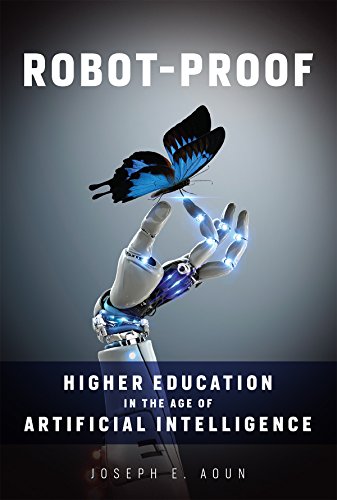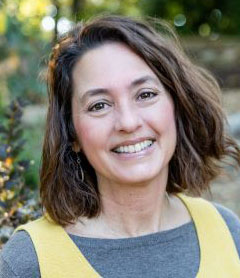
Back in March, when a state grant paid to bring Diane Mulcahy to Virginia Western to speak about the gig economy, I had the good fortune to be seated right next to the author during our group lunch at Cedars in downtown Roanoke.
I asked Mulcahy which schools were doing it right — who was truly empowering students for this entrepreneurial, gig economy. She immediately pointed to Northeastern University in Boston, which distinguishes itself with the “Northeastern Experience” — a longstanding experiential learning program that includes supervised co-ops, research and study abroad opportunities.
Somewhat serendipitously, I learned the president of Northeastern, Joseph Aoun — had recently published his own book: “Robot-Proof: Higher Education in the Age of Artificial Intelligence.”
I immediately ordered “Robot-Proof” — but I have to be honest. I was motivated to read this book mostly because of my role as a parent to a rising kindergartener.
Why?
The author mentions the same World Economic Forum statistic that rattles me as a mom who has obsessed about schooling options since before my daughter was born: 65% of children entering primary school today will eventually work in jobs that don’t exist yet.
How do we know what skills to emphasize?
Aoun outlines the framework for a new discipline to help our students navigate the changes. He calls it “humanics,” and he breaks it down to three literacies and four cognitive capacities:
Three literacies:
- Technological literacy (which includes math, coding, basic engineering and computer science principles)
- Data literacy (and exploring the social, economic and political contexts of data)
- Human literacy (emphasizing the traditional humanities, especially art and design, along with the power of personal relationships).
Four cognitive capacities:
- Critical thinking
- Systems thinking
- Entrepreneurship (“Teaching entrepreneurship — especially social entrepreneurship — should … be a matter of national consequence and priority for universities.”)
- Cultural agility
As a parent, this broad framework will help me design learning experiences for my daughter — but I’m also thinking about my own future. What can I do to prepare for major disruption?
Aoun argues the self-directed, lifelong learner will be the most robot-proof person of all.
I would love to see camps or workshops where myself AND my daughter can learn together (like basic coding or engineering, for example — is that an opportunity for this college?). I’ve also looked into a data analytics bootcamp offered by Northeastern: A relatively affordable, short-term certificate program that I can complete online.
But what about Virginia Western? Where might we fit into this conversation?
Based on Aoun’s book, I’m betting he would applaud our involvement with RAMP — the business accelerator in downtown Roanoke — and *especially* our development of entrepreneurial mindset courses through Workforce, as entrepreneurship is one of his key cognitive capacities.
He also recognizes community colleges for serving adult learners — a growing demographic.
“For generations, [community colleges] been the standard-bearers for extending the promise of higher education to the most vulnerable and underserved populations in U.S. society … The ranks of the vulnerable now include those threatened by technological change. This renders the mission of community colleges even more vital — a mission that they traditionally have met by giving students a conduit to a four-year degree and teaching career-oriented skills.”
…
“As AI, robotics, and high technology give rise to an unprecedented need for people to learn, retool, and upskill throughout their lives, higher education would do well to consider shifting its perspective …. Going forward, colleges and universities have the chance to recognize that they are not merely in the specific businesses of undergraduate education, graduate education, and research — although all of those remain vitally important. Rather, they are in the larger business of lifelong learning.”
I’m inspired by Aoun’s vision about what that might mean when we talk about Virginia Western alumni. Did you know about 85% of our alumni stay in the region after completing their programs? Keep that number in mind as you read Aoun’s prediction:
“[T]he standard alumni operation of the future will provide lifelong learners with access to venture incubators and startup assistance. It will connect professionals with accomplished mentors, offering coaching and institutional support. It will connect alumni businesses with faculty expertise and research. Furthermore, it will be the focal point for communities of interest, drawing together alumni who share professional goals, hobbies, or philanthropic objectives. In this way, the literal meaning of alma mater (“nourishing mother”) will be reinforced as graduates continue to be nourished and supported by their institution for their entire lives.”
How might Virginia Western serve students for their entire lives? One idea Aoun floats is offering a subscription model — where alumni would have continued access to services and learning opportunities. This is a more entertaining example … I’ve seen a Virginia Tech at Kings Dominion day — where Hokie alumni and their families get discounted admission. I once joked about starting occasional bowling nights based around career clusters — an advanced manufacturing team, for example, which could serve as ongoing alumni connection and a welcoming event for adults students who were curious about our programs. We could also organize our services more overtly around “jobs” — we might expand the role of the Hall Associates Career Center, help alumni upskill throughout their careers with discounts/subscriptions, and perhaps start a “Jobs Festival” to help draw families to campus and connect employers with the community.
What ideas would you like to share? How might we help “robot-proof” our community?






 Shelley Lyons is glad to be back on campus as she is a Virginia Western alum, and has served as the Administrative Officer for Grants Administration at Virginia Western since early 2022. Prior to VWCC, her career focus was within the Human Services and Arts fields. She wrote her first grant in 1996 on a whim and has continued to plan and learn since that time. She most enjoys seeing a well-planned project come to fruition, where funder, project manager and beneficiaries can all feel success and see impact.
Shelley Lyons is glad to be back on campus as she is a Virginia Western alum, and has served as the Administrative Officer for Grants Administration at Virginia Western since early 2022. Prior to VWCC, her career focus was within the Human Services and Arts fields. She wrote her first grant in 1996 on a whim and has continued to plan and learn since that time. She most enjoys seeing a well-planned project come to fruition, where funder, project manager and beneficiaries can all feel success and see impact.